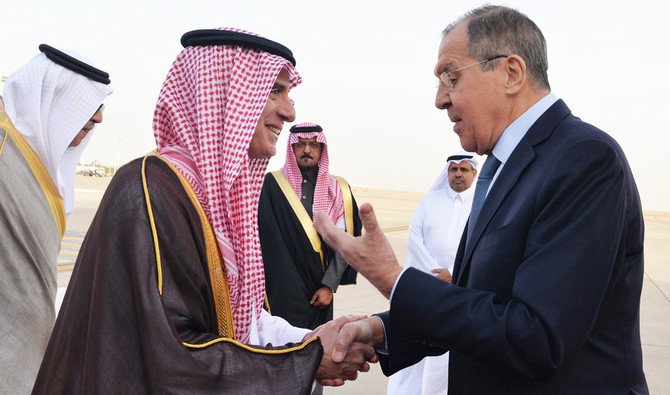Saudi Foreign Minister Adel al-Jubeir greets Russian counterpart Sergey Lavrov
UPDATE, 1145 GMT:
Russia has signalled its intention to discredit a report by international inspectors pointing to a chlorine attack by Assad regime forces on Douma in April 2018.
On Friday the Organization for the Prohibition of Chemical Weapons, in its second report on the attack, said there were “reasonable grounds that the use of a toxic chemical as a weapon took place”.
The report, summarizing witnesses and videos, said 43 people were killed in a building struck by one of two cylinders dropped from the air. The other cylinder failed to detonate, releasing any chlorine it contained.
Syria Daily, March 2: Inspectors Point to Chlorine Attack on Douma by Assad Regime
The Kremlin and Russian State media limited initial comment to noting that the report had been released, even as pro-Assad and pro-Kremlin activists spread disinformation and conspiracy theories to discredit the OPCW.
On Tuesday, the Russian Foreign Ministry said the report is “likely to be used by the West to exert pressure on Damascus” and “to support baseless accusations”.
The Ministry also alleged that the OPCW’s report may also be intended to justify airstrikes carried out by US, UK, and French warplanes on April 14, damaging three facilities connected to the Assad regime’s chemical weapons program.
It repeated Moscow’s disinformation line, put out since the suspected chlorine attack, that it was a “false flag” by the Syrian opposition, including White Helmets rescuers: “We are concerned that the mission prefers to completely ignore the substantial information provided by the Russian and Syrian parties confirming that this chemical incident had been staged by the pseudo-humanitarian organization White Helmets.“
Saudi Arabia’s Foreign Minister Adel al-Jubeir has said that it is too early to restore diplomatic ties with the Assad regime or lift its suspension from the Arab League.
Jubeir said there must first be progress to end the eight-year conflict: “(Reopening the Saudi Embassy) is related to progress on the political process, so it is still early,” Jubeir said at a joint press conference with Russian Foreign Minister Sergey Lavrov on Monday.
Russia is pressing Arab states to restore ties with the regime and to provide funding for the regime’s reconstruction programs, after the loss of 75% of Syrian GDP and more than $400 billion in damage.
But Jubeir said Riyadh will not participate in any reconstruction initiatives before stability is restored in Syria.
The Saudi position is in contrast to that of its close ally the UAE, which reopened its embassy in December.
Anwar Gargash, the UAE’s Minister of State for Foreign Affairs, said:
There’s zero Arab influence in Damascus. Zero.
Because we burned all our bridges in 2011, that has allowed regional players such as Turkey and Iran to be the main determinant. And suddenly the Arabs have zero say.
Several Arab nation are expressed to support the Assad regime’s readmission to the Arab League at a summit in Tunisia this months.
But with Saudi Arabia and Egypt still opposing restoration, officials say there is no agreement for the lifting of the suspension. Arab League Secretary General Ahmed Aboul Gheit said in February, “For Syria to return, there must be consensus. I do not yet observe conclusions that lead to the consensus that we are talking about.”
The UAE has also drawn the line at providing economic assistance. “We still believe investment in reconstruction should be tied to political progress,” Gargash said.

